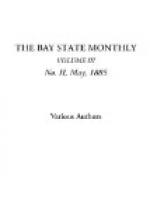In 1852 the Raritan Bay Association, consisting of thirty or forty educated and cultured families of congenial tastes, was formed at Eagleswood, near Perth Amboy, New Jersey; and a year later Mr. and Mrs. Weld were invited to join the Association, and take charge of its educational department. They accepted, in the hope of finding in the change greater social advantages for themselves and their children, with less responsibility and less labor; for of these last the husband, wife, and sister, in their Belleville School, had had more than they were physically able to endure longer. Their desire and plan was to establish, with the children of the residents at Eagleswood, a school also for others, and to charge such a moderate remuneration only as would enable the middle classes to profit by it. In this project, as with every other, no selfish ambition found a place. They removed to Eagleswood in the autumn of 1854.
In the new school Angelina taught history, for which she was admirably qualified, while Sarah taught French, and was also book-keeper.
It is scarcely necessary to say that few schools have ever been established upon such a basis of conscientiousness and love, and with such adaptability in its conductors, as that at Eagleswood; few have ever held before the pupils so high a moral standard, or urged them on to such noble purposes in life. Children entered there spoiled by indulgence, selfish, uncontrolled, sometimes vicious. Their teachers studied them carefully; confidence was gained, weaknesses sounded, elevation measured. Very slowly often, and with infinite patience and perseverance, but successfully in nearly every case, these children were redeemed. The idle became industrious, the selfish considerate, the disobedient and wayward repentant and gentle. Sometimes the fruits of all this labor and forbearance did not show themselves immediately, and, in a few instances, the seed sown did not ripen until the boy or girl had left school and mingled with the world. Then the contrast between the common, every-day aims they encountered, and the teachings of their Eagleswood mentors, was forced upon them. Forgotten lessons of truth and honesty and purity were remembered, and the wavering resolve was stayed and strengthened; worldly expediency gave way before the magnanimous purpose, cringing subserviency before independent manliness.
Then came the war. In 1862 Mrs. Weld published one of the most powerful things she ever wrote,—“A Declaration of War on Slavery.” We have not the space to follow the course of the sisters’ lives farther; and, were it otherwise, the events narrated would be all too familiar. Sarah, after a somewhat prolonged illness, died on the 23d of December, 1873, at Hyde Park, Mass. The funeral services were conducted by the Rev. Francis Williams, and eloquent remarks were made also by Wm. Lloyd Garrison. On the 26th of October, 1879, Angelina passed quietly away, and the last services were in keeping with the record of the life then commemorated. We close this writing with a passage from the remarks which Wendell Phillips made on that occasion. No words could possibly be more touching or more eloquent:—




